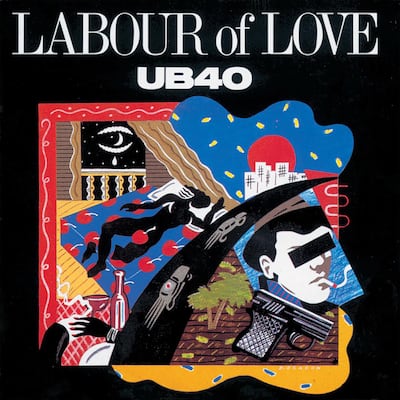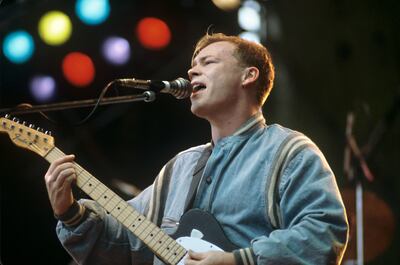The UB40 album Labour of Love was not only a creative and commercial breakthrough for the UK reggae group, but a way of life for singer Ali Campbell.
It’s what kept the singer, 64, going strong for more than 40 years and weathering the storm of starting his own version of UB40 after leaving the original group in 2008.
The acrimony took a slightly absurd turn in 2014 when both UB40s played in Dubai within weeks of each other and declaring to The National they were the real deal.
Tensions stilled over the years with both groups settling and releasing albums of their own.
Speaking to The National before a now cancelled Saturday performance at Etihad Arena due to ill health, Campbell says the drama is now behind him.
Instead, he reflects on how 2023 marks the 40th anniversary of Labour of Love, the album that changed his life.
More than the millions of copies sold and getting to play in arenas around the world, Campbell credits the upbeat recording for permanently changing perceptions of the group.
“At the time we were known as being this politically motivated band and we weren't liked by the media because of that,” he says. “They thought we were angry and it was a case of 'here is UB40 moaning again'.
“But Labour of Love was always something we wanted to do when we first started the band and that's to record the songs that made us fall in love with reggae.”

The reason for waiting until the fourth album to record the cherished tracks, Campbell says, is that it was a period in the music industry where groups were expected to write their own material.
Since that was the case, UB40 drew upon their experiences growing up in socially disenfranchised communities in Birmingham as inspiration.
Named after an unemployment benefits form, UB40's hard-hitting earlier material such as One in 10 and King were driven by a sense of desperation.
“I was living on £7.90 a week for three years, and four pounds of that went on rent and the rest was to feed myself,” recalls Campbell. “That's why we called our first album Signing off because we were desperate to get off the dole.
“But as well as this need to find employment, we also loved reggae so when we decided to start the band there was no choice about the kind of music that we were going to play.”
Could the unexpected benefit of recording Labour of Love five years into the band’s career made them a well-oiled machine in the studio?
“I wouldn’t go that far,” Campbell laughs. “We were totally self-taught and we had to obtain our instruments in various ways. I only got my guitar after receiving compensation for getting glassed in the face.
“My older brother, who is a legal executive, sorted it for me and when we got that lump of money we also used it to by our first amplifiers.”

The musical education extended to some of the songs recorded for Labour of Love, particularly in the lead single and smash hit Red Red Wine.
Recorded in a style similar to the 1969 reggae version by Jamaican singer Tony Tribe, Campbell recalls initially being surprised when learning the original song was recorded two years earlier by US singer Neil Diamond.
“I was about four years old when Tribe's version came out and I remember loving it immediately and how brilliant it all sounded,” he says.
“When it comes to picking the songs on the album, like So Many Rivers to Cross by Jimmy Cliff and Cherry Oh Baby by Eric Donaldson, it was easy. Because they were our heroes and they introduced to a lot of us to this wonderful world of reggae. We just wanted to pass that on to a new generation.”
With UB40 renowned as one of reggae’s most successful bands, that objective has been well and truly met. However, there are more rivers to cross for Campbell as he gets ready for another big year of touring.
“I have taken this band to more than 70 countries over the last five years, including places like Papua New Guinea and Solomon Islands,” he says. “I am lucky that we have a worldwide fan base because reggae is the kind of music you can take everywhere. It brings joy.”


